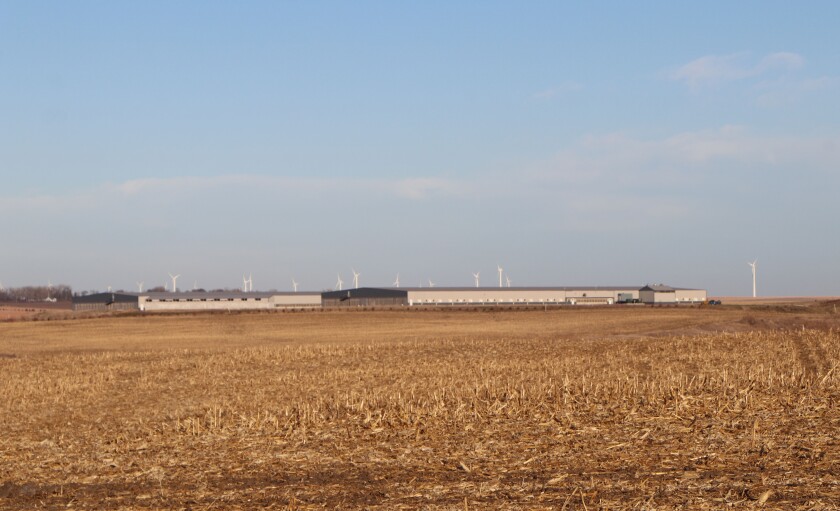WILLOW LAKE, S.D. — Many of today’s new finish-feeding operations involve “contract finishers,” pig owners working with finishers who own the barns and do the feeding.
Windy Oak Farms is one of those “pig owners.”
Nick Fitzgerald, represents Windy Oak, in a deal involving
Samantha and Taylon LaMont in their venture, TSL Inc., at Carpenter, South Dakota
. Nick, his brother, and two partners seek and work with contract growers in South Dakota and Iowa. Nick met with Agweek to describe how it works.
Windy Oak was started by his father, Tom Fitzgerald, now a retired swine animal nutrition sales man for Cargill, and sons Mike and Nick, all from Mechanicsville, in east-central Iowa.
“I’ve been involved in the pork industry for the past 25 years,” said Nick, age 40. The Fitzgeralds separately, also jointly operate Rock Creek Family Farms — corn, soybeans and cattle — on their home farms, as well as other businesses, including real estate.
There are many cross-connections in the pig business.
In 2011, the Fitzgeralds started “Black Oak Farms,” to raise pork, as his sons emerged from college. There were three financial partners.

Mikkel Pates / Agweek
In 2014, the Black Oak owners changed the name to “Windy Oak Farms” and invested in Bobcat Farms LLC, a 5,800-sow farm that in 2019 started operations at Elkton, South Dakota. Bobcat Farms partners include two farms in Iowa — including Windy Oak — two in South Dakota, and one in Minnesota.
Pipestone and its Pipestone Veterinary Services of Pipestone, Minnesota, manage Bobcat Farms and 70 other similar sow farms across the country. Pipestone oversees production of 320,000 sows in the Midwest. Nick said 465 independent pork producers own shares in Pipestone-managed sow farms.
Bobcat Farms produces 150,000 weanling piglets a year, or 2,500 per week, for 26 barns. Windy Oaks has 10 of those barns.
Besides working for Windy Oak, Nick also is director of business development and grow finish operations for Pipestone.
In the Pipestone role, Nick seeks “partners” for Pipestone to manage at all levels of the hog enterprise — sow barns, pig suppliers, and contract growers. Essentially, he’s looking for businesses like Bobcat Farms, Windy Oak and TSL Inc.
The way Nick remembers it, the TSL/LaMont deal started when Taylon’s father, Doug LaMont, contacted Scott VanderPoel, a swine veterinarian he knew at Pipestone. VanderPoel contacted Nick, who first offered the LaMont opportunities to Pipestone clients, other shareholders of sow farms.

Mikkel Pates / Agweek
Other pig owners at the time declined. Only Windy Oak was pursuing opportunities like this in that area.
So, Windy Oak struck a deal with the LaMonts, who built their barn for about $850,000. Like others Nick puts together, the building holds up to 2,400 “finished” pigs in 10 pens on each side of the barn. The animals start at 16 to 17 pounds and are fed for about six months, reach 280 to 290 pounds. Finished pigs are sold through packing plants in Minnesota, South Dakota and Iowa. Windy Oak acquires feed from Howard Farmers Co-op Association of Howard, South Dakota.
Importantly, Pipestone oversees veterinary care at TSL Inc., like they do at all Windy Oak sites.
The Windy Oak contract goes 10 years. Windy Oak “rents” the barn at $43 “per head space.” They pay the LaMonts whether the barns are empty or full. (Some contract pig operators penalize contract growers if death rates exceed certain standards, but Windy Oak does not.
“Oftentimes herd health is out of their control,” Nick said.)
The LaMonts feed the pigs, manage them, sort them for market, and load them into trucks. The barns “turn” twice a year.
Nick said Windy Oak Farms and Pipestone are both looking to grow.
Economics and feed availability conditions are strong into northeast South Dakota and even farther north. The biggest factors dampening livestock facility investment today are hyper-inflation on building costs and loan interest rates at 7%.
Clark County is friendly to development. Windy Oak is one of three or four integrators active there. Windy Oak works with three hog finishers in the Willow Lake area.
The county seat is in Clark, about 35 miles west of Watertown and 60 miles northeast of Huron. The
county commission is supportive of livestock development
, but not everybody is, Nick said.
All projects must meet local and state environmental standards and setbacks. Manure pits and field-applied manure are sampled on a regular, annual basis. Manure applications are highly regulated.
Yes, North Dakota has corn and soybeans and other infrastructure, but Pipestone has tried some efforts north of the border and abandoned them because of
citizen opposition
.
“If the political climate allows us to do so, I think North Dakota would be a fine place,” he said. “It is important that we are good neighbors and have good neighbors,” Nick said.
/cloudfront-us-east-2.images.arcpublishing.com/reuters/KWJFDEAMYROU5JT6H4MUD2DEVI.jpg)